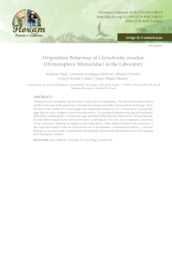Oviposition behaviour of Cleruchoides noackae (Hymenoptera: Mymaridae) in the laboratory.
Oviposition behaviour of Cleruchoides noackae (Hymenoptera: Mymaridae) in the laboratory.
Autoria: HAAS, J.; BARBOSA, L. R.; POTRICH, M.; LOZANO, E. R.; MAZARO, S. M.
Resumo: Thaumastocoris peregrinus has become a major pest in eucalyptus. The most promising control method is the use of the parasitoid, Cleruchoides noackae, but little is known about its biology. Thus, the aim of this study was to investigate the oviposition behaviour of C. noackae in T. peregrinus eggs laid on strips of paper towel in the laboratory. 12 copulated females were placed in a plastic petri dish containing five T. peregrinus eggs and their behaviour was observed for 30 min/female. Several behavioural events were performed: searching for the host, host evaluation, insertion of the ovipositor, internal recognition and oviposition. Time elapsed between the insertion of the ovipositor and its removal varied from two to ten minutes. Learning more about C. noackae biology is very important to understand the dynamics between the parasitoid and its host, aiming at its biological control.
Ano de publicação: 2018
Tipo de publicação: Artigo de periódico
Unidade: Embrapa Florestas
Palavras-chave: Biologia reprodutiva, Bronze bug, Eucalipto, Eucalyptus, Parasitoide, Parasitoids, Percevejo bronzeado, Thaumastocoris peregrinus
Observações
1 - Por padrão são exibidas publicações dos últimos 20 anos. Para encontrar publicações mais antigas, configure o filtro ano de publicação, colocando o ano a partir do qual você deseja encontrar publicações. O filtro está na coluna da esquerda na busca acima.
2 - Para ler algumas publicações da Embrapa (apenas as que estão em formato ePub), é necessário ter, no celular ou computador, um desses softwares gratuitos. Sistemas Android: Google Play Livros; IOS: iBooks; Windows e Linux: software Calibre.
Acesse outras publicações
Acesse a Base de Dados da Pesquisa Agropecuária (BDPA) para consultar o acervo completo das bibliotecas da Embrapa.

